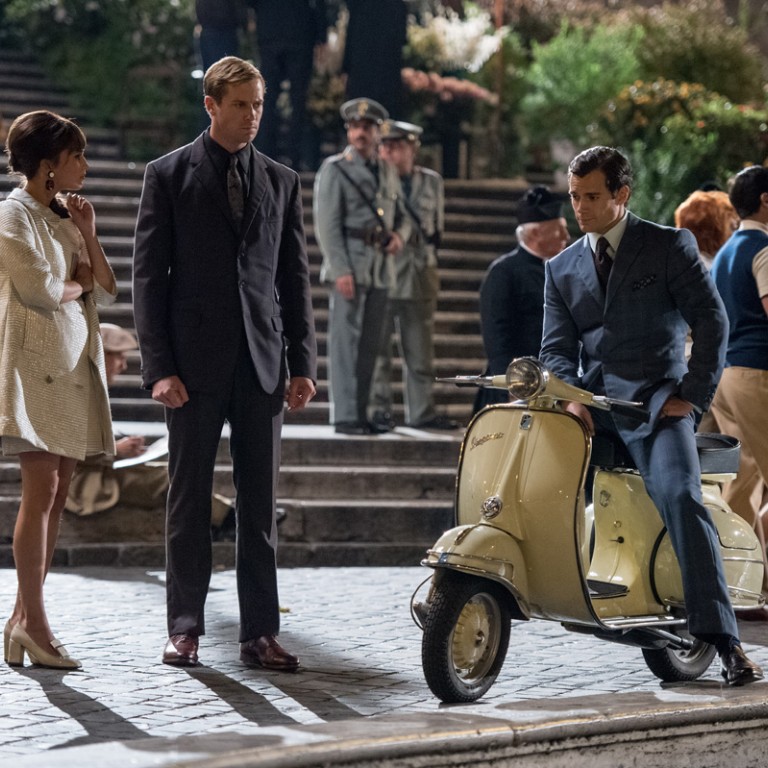
From Ritchie with love: a touch of Bond in Man From U.N.C.L.E.
'It’s a mix of the early 007. It’s very gentlemanly humour. There’s a high-class wit to it,' says co-star Alicia Vikander of Guy Ritchie's new take on cold-war espionage tale - this summer's most stylish spy movie
Hollywood might as well label 2015 as the year the spy came in from the cold. Colin Firth’s umbrella-twirling agent has already helped steer Matthew Vaughn’s comic-book adaptation Kingsman: The Secret Service to global box office sales of US$400 million. Tom Cruise’s IMF spy Ethan Hunt is doing something similar for Mission: Impossible – Rogue Nation. Then there’s the highly anticipated return of Daniel Craig as 007 in this autumn’s James Bond film, Spectre.
This week, it’s the turn of British director Guy Ritchie. Like Mission: Impossible, The Man from U.N.C.L.E. is based on a 1960s television show centred on an elite worldwide intelligence agency.
“I wanted to dust off an old moniker, an old title,” admits Ritchie, who has already found success doing just that with his two Sherlock Holmes movies starring Robert Downey Jnr as Arthur Conan Doyle’s fictional detective.
film review: The Man from U.N.C.L.E. - style and substance
The original U.N.C.L.E. ran for four years and 105 episodes, ending in 1968. Launched amid the cold war, the concept saw the coming together of American and Soviet agents – respectively, Napoleon Solo (Robert Vaughn) and Illya Kuryakin (David McCallum). Ritchie’s film has stuck to the script. Set in the ’60s, CIA operative Solo is played by Henry Cavill (best known as Superman from Man of Steel) and Kuryakin is taken on by Armie Hammer (The Lone Ranger).

“I was really glad when they did this story that they didn’t completely modernise it,” says Hammer. “They’re taking a very fresh take on this whole movie. It could’ve taken place 10 years in the future when another big war was going on. The fact that it does take place in the ’60s, the fact that it is the cold war … everybody is aware of the tension between the US and the Soviet Union during the cold war, and that is able to generate a good dynamic between the characters on its own.”
Wisely, given that U.N.C.L.E. will only be dimly remembered by most people under the age of 50, the script by Ritchie and his regular producer Lionel Wigram sets out to tell how Solo and Kuryakin first met – and how the United Network Command for Law and Enforcement came into being. Here, Solo and Kuryakin are reluctantly brought together to hunt down a criminal organisation – led by Elizabeth Debicki’s loudly attired villainess Victoria – looking to dominate the nuclear arms race.
So is this a comment on the current political climate, with concerns about the nuclear capabilities of both North Korea and Iran? “We’re not thinking about the correlation between politics now and politics then,” claims Ritchie.

Rather, he wanted to show the world as it was, dealing with such issues for the first time. “Back then, it was more serious, with the creation of weapons of mass destruction, which hadn’t been around before, so it felt like a more imminent threat. The stakes were more volatile.”
If this lends an edge to U.N.C.L.E. it’s embodied in the Solo-Kuryakin relationship. “They’re polar opposites but they’re both very good at what they do,” says Cavill. “They’re experts in their own fields. Those fields sometimes gel wonderfully and other times clash spectacularly.”
Or as Hammer puts it more bluntly: “He doesn’t trust me. I don’t trust him. He doesn’t like me. I don’t like him.”
From fashion choices to espionage tactics, East-West relations have never seemed so icy.

It’s here where the film’s levity comes from. “I love how it’s an old spy movie in a sense,” says co-star Alicia Vikander. “It’s a mix of the early 007. It’s very gentlemanly humour. There’s a high-class wit to it. But it’s not throwing the jokes at you.”
The Swedish star, who recently made an impression in Alex Garland’s Ex Machina, plays “tomboy” Gabby Teller, an East German mechanic who proves key for the film’s two spies when it comes to penetrating the villainous organisation. It’s no surprise that Vikander feels the film resembles Sean Connery-era James Bond films. “Lionel and I are both Bond fans, particularly early Bond,” admits Ritchie, and you can’t help but think of his second outing, From Russia With Love – when Connery’s 007 goes against Robert Shaw and Lotte Lenya, two agents from havoc-wreaking terrorist group Spectre.
Unquestionably, Ritchie’s U.N.C.L.E. is the most stylish spy film of the summer. The dresses, by Joanna Johnston, bear all the hallmarks of fashions seen in Vogue magazine and on a young Catherine Deneuve. Likewise, the locations and props plunder that ’60s chic recently made popular by TV show Mad Men.

“You’re standing in the middle of the square,” says Hammer. “And you’ve got these great old Citroëns, Fiats and Alfa Romeos all driving in a circle around you, and you feel like you’re there.”
With all those fights and speedboat chases, Cavill admits he’s had to hit the gym – even if playing Solo wasn’t quite as demanding as Superman. “It’s always important to stay in shape for these kinds of things,” he says. “You’re playing a spy, essentially, and they’re not going to be hugely out of shape. So there was a bit of physicality required, but not to the extent that Man of Steel was.”
But as Hammer points out, U.N.C.L.E. is about more than physical prowess. “Personally, it’s about the ability to focus two enemies towards the greater good.”
Détente has never looked so beautiful.
The Man from U.N.C.L.E. opens on August 13

 (1).JPG?itok=0BHk6odg&v=1665981271)